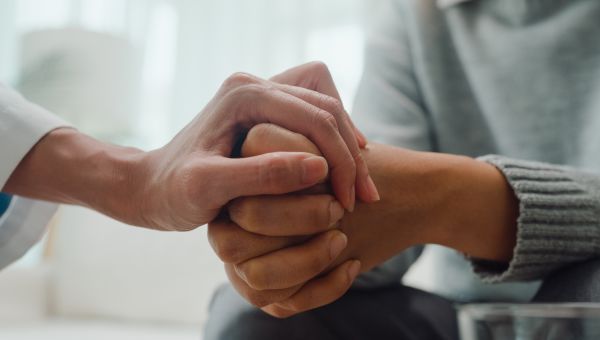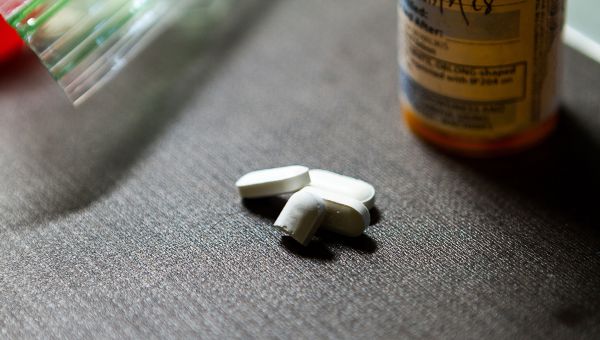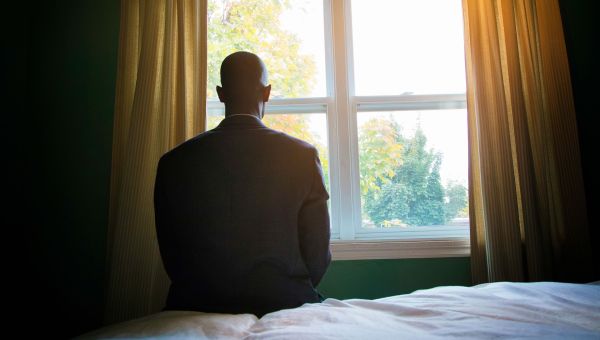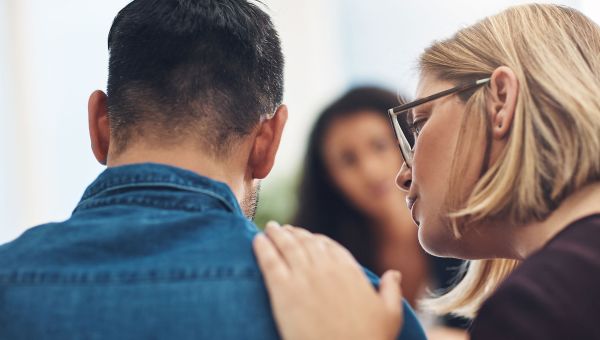Understanding the aftermath of sexual assault
The mental, emotional, and physical effects may last long after an assault. Here’s what to know and how to find help.
Updated on November 20, 2023

Sexual assault is a difficult and often painful topic to discuss. The content in these pages may be distressing for survivors of sexual assault and their loved ones. If you are experiencing a crisis, reach out to the National Sexual Assault Online Hotline to chat confidentially with a trained professional or call, text, or chat 988 to reach the Suicide and Crisis Lifeline any time of day. Additional resources can be found throughout this slideshow.
Sexual violence is all too common in the United States. Every 68 seconds, a person is sexually assaulted, according to the Rape, Abuse & Incest National Network (RAINN). One in three American women and one in four men has experienced sexual violence involving physical contact in their lifetime, estimates the Centers for Disease Control and Prevention (CDC). One in five women has experienced attempted or completed rape. For men, the figure is one out of 38.
Every nine minutes, a child is sexually abused in the U.S., according to RAINN, with one in nine girls and one in 20 boys under the age of 18 experiencing sexual abuse or assault.
The figures for transgender people are higher. Research suggests that one in two transgender people are sexually abused or assaulted at some point in their lives. Some groups within the transgender community—including youth, people of color, people with disabilities, people experiencing homelessness, and people involved in sex work—have higher rates still.
Despite the prevalence of sexual violence, only about 1 in 40 perpetrators will actually end up in prison, RAINN reports.

Defining sexual assault
Sexual assault is any unwanted sexual activity that involves force, threats, or taking advantage of someone who is not able to give consent. It is never the fault of the person who is assaulted.
A person may be forced to deal with many urgent issues following sexual trauma, including bruising, bleeding, sexually transmitted infections, broken bones, and pregnancy. Additional physical and mental effects of trauma—such as chronic abdominal and pelvic pain and eating disorders—can last for years afterwards.
“When we are under stressful conditions, such as experiencing abuse, our bodies secrete stress hormones which can predispose us to a variety of potential medical issues,” says Christopher Rossilli, PsyD, a medical psychologist in Jacksonville, Florida.
Learn more about the potential long-term effects of sexual assault in the slides that follow, plus where to go for help.

PTSD
It’s common to experience anxiety following assault. If these feelings don’t subside after several weeks or they start to affect your day-to-day life, you may have post-traumatic stress disorder (PTSD). It’s a type of anxiety disorder that can occur after an upsetting event.
Symptoms can vary, but some of the most common include:
- Experiencing flashbacks
- Avoiding activities that remind you of the traumatic experience
- Losing interest in activities you once enjoyed
- Consistently feeling like you’re on edge
- Having difficulty sleeping or bad dreams
- Becoming easily frightened
- Being prone to angry outbursts
- Harboring negative thoughts
There are a variety of treatments for PTSD. Psychotherapy, also called talk therapy, involves working with a mental health professional to shift your thought processes to better manage your feelings. During sessions, you may talk about how to recognize guilt and shame following a traumatic event. A therapist can also help you develop relaxation techniques and determine whether antidepressants or medications that treat anxiety would be helpful to you.

Flashbacks
It’s possible to relive traumatic events through flashbacks, which occur when vivid memories resurface in your mind. Flashbacks can be set off by someone’s voice, odor, or actions. They can occur at any time. If you’re experiencing a flashback, RAINN suggests these ways to calm your mind:
Take deep breaths. Place your hand on your stomach. Feel it move up and down as you slowly inhale and exhale.
Remind yourself it’s just a flashback. Even though it may seem like you’re back in the moment with the perpetrator, remember that you’re not. The abuse is over and you are alive.
Use your five senses. Snapping out of a flashback can be difficult, but it can help to do the following:
- Look around and take note of things you see, like furniture, artwork, and people.
- Breathe in and focus on the smells around you.
- Listen to sounds around you or play some music.
- Eat or drink something. Focus on the flavors of one of your favorite foods or drinks.
- Hold something hot or cold and notice what it feels like in your hand.
Understanding the warning signs and triggers of flashbacks—like being at a party or around a friend of the perpetrator—may help you better manage them.

Depression
It’s common to have feelings of sadness and hopelessness following sexual assault. But if these feelings continue for an extended period of time and affect your day-to-day activities, it could be depression.
While contributors to depression can include family history, biology, and environment, other common risk factors include major life changes, trauma, and stress. A licensed professional can help determine whether you are experiencing depression or the ongoing effects of the traumatic experience. Seek help if you have any of these symptoms every day for at least two weeks:
- Sadness
- Hopelessness
- Loss of interest in things you once found enjoyable
- Irritability
- Feelings of guilt
- Anxiety
- Fatigue
- Restlessness
- Changes in appetite or weight
There are many treatments available for depression. Antidepressants and talk therapy are the most common. Self-management techniques like exercise, relaxation, and goal-setting can also help.

Sleep Disorders
It can be difficult to sleep after a traumatic event, especially if it took place in a bedroom. Even if it did not, people who have been sexually assaulted may experience trouble falling and staying asleep or urges to sleep in the middle of the day. Nightmares are also common, as are serious conditions like chronic insomnia (defined as having difficulty falling or staying asleep three or more nights per week for at least three months).
If you’re having sleep problems or feeling so tired during the day that it interferes with your activities, reach out to a healthcare provider (HCP). Cognitive behavioral therapy, which helps survivors work through problems by reframing thoughts and changing behavior, may help. Your HCP may also recommend prescriptions or over-the-counter medications.
Relaxation training to help with sleep may include progressive muscle relaxation, breathing exercises, or meditation. Your HCP may also advise adopting a healthy bedtime routine, reducing screen time before bed, and limiting caffeine.

Substance Use Disorder
While it may seem like using alcohol and drugs can help you escape the pain of a traumatic event, doing so can make things worse. Some signs of substance use disorder include:
- Displaying a loss of control in using alcohol or drugs
- Stealing money from friends or family members to buy alcohol or drugs
- Avoiding activities you once enjoyed because they don’t involve alcohol or drugs
- Lying about substance use
- Driving while under the influence of alcohol or drugs
- Taking risks in order to get alcohol or drugs
- Substance withdrawal, which involves experiencing physical symptoms (such as agitation, sweating, insomnia, or nausea) when you try to stop using drugs
- Drinking alcohol or using drugs more often than you want to
If you or someone you know is displaying a loss of control in using alcohol or drugs, there are ways to get help. You can find a local behavioral health treatment center through the Substance Abuse and Mental Health Services Administration’s website or by calling their hotline at 800-662-4357.
Treatment programs for substance use disorders can be for individuals or in group settings. They may involve cognitive behavioral therapy or 12-step facilitation therapies (such as Alcoholics Anonymous).

Self-Harm
Painful feelings resulting from trauma may lead to self-harm or self-injury, such as biting, burning, cutting, or scratching. Some survivors say they harm themselves because it helps numb the pain, releases feelings, and makes them feel in control. The reality is that such relief is only temporary and often leads to repeated episodes of self-harm, which can result in skin damage, infections, and other severe medical issues or even death. If you feel the urge to hurt yourself, try to:
- Put the object you were going to use for self-harm in another room and out of sight.
- Take a walk outside.
- Contact a friend or loved one about anything that’s on your mind.
You may also try to distract yourself from the impulse by taking a shower or a bath (making sure to remove all razors from the area) or rubbing an ice cube across the area you were planning to harm.
If you’re having a difficult time controlling the inclination to hurt yourself, the Self-injury Outreach & Support website can help. The organization provides personal stories from survivors, resources to help you cope with self-harm tendencies (both long-term and in the moment), and information for family members or educators to help.

Suicide
Suicidal thoughts may cross survivors’ minds, and the longer the abuse occurs, the greater the risk of suicide. Studies show that people who were sexually abused during childhood or adolescence are more likely to attempt suicide than those who were not abused. Warning signs of suicide include the following:
- Talking about wanting to die or kill yourself
- Searching online for ways to kill yourself or how to buy a gun
- Discussing feelings of hopelessness or having no reason to live
- Feeling trapped or like you’re in intolerable pain
- Using increasing amounts of drugs or alcohol
- Anxiety, agitation, and acting out recklessly
- Changes in sleep
- Isolating or withdrawing yourself
- Extreme mood swings
If you or someone you know is contemplating suicide, call, text, or chat the Suicide and Crisis Lifeline at 988. Crisis workers are there 24/7 to listen, understand, and help you work through these feelings. If you or someone you know is actively considering suicide, call 911 right away or go to the nearest emergency department.

Be Patient During The Healing Process
Recovering from sexual abuse can take a long time, and some feelings and emotions may stay with you for the rest of your life, says Rossilli—but that’s okay. They key is to seek treatment.
“I’ve lost count of the number of people who come to me in their 40s, 50s, and 60s who essentially had no treatment,” says Rossilli, who helps patients in his practice recover from trauma. “No treatment means no healing.” When the healing process doesn’t take place, he says, the invisible emotional wounds are left open.
Rossilli recommends finding a psychologist or counselor with whom you can really connect. “It’s likely you’re going to have some trust issues after being abused, so finding someone you can talk to openly is really beneficial.”
You can start by reaching out to RAINN’s National Sexual Assault Online Hotline to chat confidentially with a trained professional who can listen to your experience and provide resources and referrals to help you recover.
People of color and transgender people who have experienced sexual assault may find it more challenging to find culturally competent and affirming mental health providers. (Cultural competence means understanding someone’s background and values, taking into account their race, ethnicity, culture, socioeconomic status, gender identity, and sexuality.)
Organizations that offer support and directories of providers include:

RAINN. Scope of the Problem: Statistics. Accessed November 17, 2023.
Centers for Disease Control and Prevention. National Center for Injury Prevention and Control.
Division of Violence Prevention. Preventing Sexual Violence. 2019.
RAINN. Children and Teens: Statistics. Accessed November 17, 2023.
Human Rights Campaign. Sexual Assault and the LGBTQ Community. Accessed November 17, 2023.
RAINN. Sexual Assault. Accessed November 17, 2023.
RAINN. Post-Traumatic Stress Disorder. Accessed November 17, 2023.
National Institute of Mental Health. Post-Traumatic Stress Disorder. Last Reviewed: May 2023.
RAINN. Flashbacks. Accessed November 17, 2023.
RAINN. Depression. Accessed November 17, 2023.
National Institute of Mental Health. Depression. Last Reviewed: September 2023.
National Institute of Mental Health. Substance Use and Co-Occurring Mental Disorders. Last reviewed: March 2023.
RAINN. Self-Harm. Accessed November 17, 2023.
Substance Abuse and Mental Health Services Administration. Self-Harm. Last Updated: April 24, 2023.
Steine IM, Skogen JC, Hysing M, Puigvert L, Schønning V, Sivertsen B. Sexual harassment and assault predict sleep disturbances and is partly mediated by nightmares: Findings from a national survey of all university students in Norway. J Sleep Res.
Belleville G, Dubé-Frenette M, Rousseau A. Sleep disturbances and nightmares in victims of sexual abuse with post-traumatic stress disorder: an analysis of abuse-related characteristics. Eur J Psychotraumatol. 2019;10(1):1581019. Published 2019 Mar 21.
Brokke SS, Bertelsen TB, Landrø NI, Haaland VØ. The effect of sexual abuse and dissociation on suicide attempt. BMC Psychiatry. 2022;22(1):29. Published 2022 Jan 10.
Laughlin, Kyra. What Puts Survivors at Increased Risk for Suicide and How to Help. National Sexual Violence Resource Center. September 10, 2018.
Mainali P, Motiwala F, Trivedi C, Vadukapuram R, Mansuri Z, Jain S. Sexual Abuse and Its Impact on Suicidal Ideation and Attempts and Psychiatric Illness in Children and Adolescents With Posttraumatic Stress Disorder. Prim Care Companion CNS Disord. 2023;25(1):22m03239. Published 2023 Jan 17.
National Institute of Mental Health. Frequently Asked Questions About Suicide. Revised 2023.
Palumbo, Laura. The Connection Between Eating Disorders and Sexual Violence. National Sexual Violence Resource Center. February 26, 2018.
More On

article

slideshow

article

article

article
